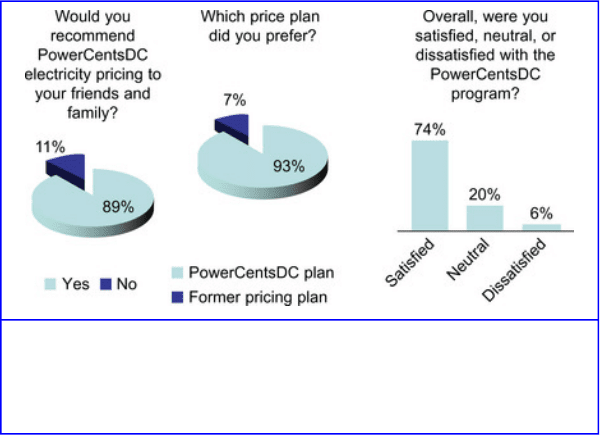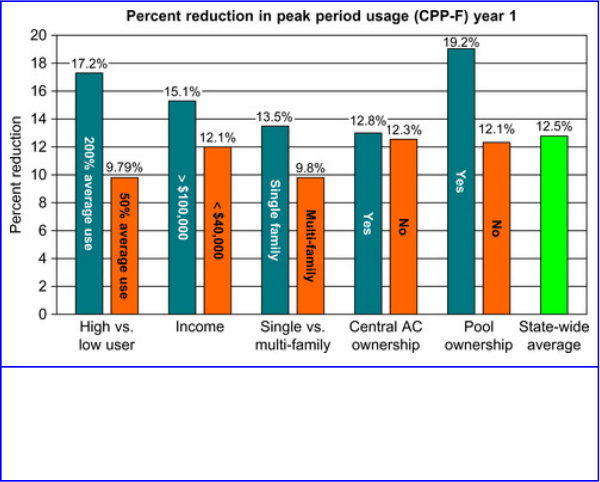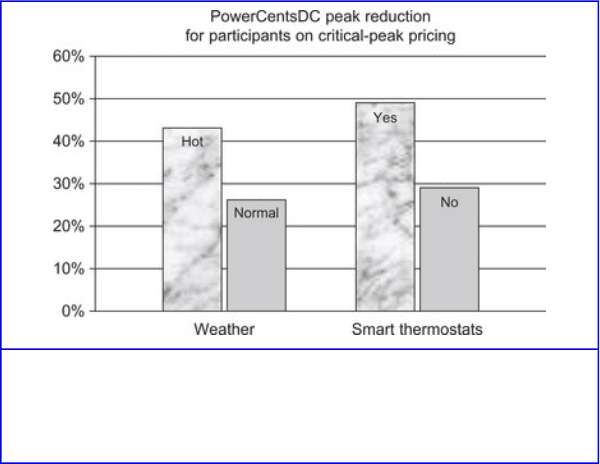Sioshansi F.P. Smart Grid: Integrating Renewable, Distributed & Efficient Energy
Подождите немного. Документ загружается.

• One energy app (carbon footprint calculator).
Consumers are willing to spend on products that enhance
their entertainment and convenience. That provides a good
roadmap for home automation positioning: dynamic pricing,
demand response, and energy efficiency folded into home
automation scenarios will allow consumers to enjoy relatively
sophisticated automation for less cost.
The energy industry has not traditionally marketed products
to consumers because it didn't have to—almost every
household is a utility customer. In contrast, appliance vendors
have been marketing to consumers since the invention of the
electric coffee percolator in 1865 by James Nason.
9
9
Consumer Appliance Timeline [9].
Consider a purchase of a new washing machine and dryer
today. One way to assess what features of new washers and
dryers are important to consumers is to look at how vendors
are marketing them. In almost every ad, styling is either
mentioned directly or highlighted by showing matched
machines in bright colors against a neutral background.
Another highly touted feature is steam, which consumers are
told will remove stains and odors, and reduce wrinkles. Some
ads, but not all, mention energy efficiency and reduced water
use, but more often, ads dwell on larger load capacity.
Early adopters of front-loader washers and dryers may have
been strongly influenced by energy efficiency, along with
how well the machines clean clothes. But for consumers
coming after early adopters, energy efficiency likely plays a
smaller role. Consumers are willing to accept energy
efficiency as a benefit, but this is partly because the machines
741
also clean clothes better than the older, less efficient designs.
Consumers are not forced to choose between energy
efficiency and the coolest washing machines on the
market—they can have both.
What does this tell us about consumer adoption of home
automation and smart appliances? We need to make smart
grid technology appealing to early adopters, and the appeal
needs to extend beyond practical considerations. While the
front loaders offer convenience (more laundry in each load)
and clothes are treated more gently (saving money on
clothes), they also offer a new stylish design, clothes are
tumbled differently (new feature), and they offer some degree
of entertainment. Laundry is more fun when you are using
colorful appliances that play soft musical tones when you are
selecting your cycles and when the cycle is done.
We are fortunate that home automation companies and
appliance vendors have experience marketing to consumers
and will find ways to make their product offers exciting to
consumers, not just practical. Many consumers purchased the
new iPad™ without having a real clear idea on how they were
going to use it; but they knew they wanted it.
10
10
In less than three months, Apple sold three million iPads (Apple press
release on June 22, 2010.) See http://www.apple.com/pr/library/2010/06/
22ipad html.
However, the smart grid and home automation are not seen as
a positive development by all consumers. Scenarios that
provide convenience and security can simultaneously
introduce threats to consumer privacy or safety. If doors can
be locked using a smart phone app, can they be unlocked by
742
someone with ill intent? Will others be able to analyze energy
usage data to tell if someone is home, or home alone?
Clearly, home automation has to provide security along with
convenience. Consumers may want to lock doors using
automation but they won't want strangers unlocking their
doors by hacking into their system. This will be the challenge
for home automation vendors—sell the benefits and manage
the risks. Utilities and authorized third-party providers,
including energy suppliers, home automation vendors, and so
on, also have to plan for and then protect consumer privacy.
From a marketing perspective, there will always be some
consumers who prefer the way things are and won't adopt new
products in the short or medium run even if they would
benefit from adoption. However, consumers who object to the
smart grid now may find that some of the benefits are
appealing after all, such as tracking their energy spending on
a daily basis and being alerted when their energy use
suddenly increases.
Consumer activists now opposing smart metering
implementations may find that the vast majority of customers
appreciate having assistance in managing their energy usage
and that the industry has managed security issues to the
satisfaction of consumers. After all, security breaches are
frequently reported about the Internet, but how many have
stopped using it? As a society, online purchases are increasing
rather than decreasing, and this is occurring despite the
persistent threat of fraud.
11
11
“According to a recent global survey conducted by the Nielsen
Company, over 85% of the world's online population has used the
743
Internet to make a purchase, up 40% from two years ago, and more than
half of Internet users are regular online shoppers, making online
purchases at least once a month [10].
The Internet offers benefits to consumers, and these benefits
are highly valued. If our industry can position home
automation with embedded smart grid features in a similar
manner—providing high value—then consumer adoption
should follow the pattern of other new technologies. The key
is providing high value to consumers and to utilities.
Policy Makers' Burden
Policy makers—including utility executives, regulators,
consumer advocates, industry pundits, and lawmakers—set
policies that try to blend the needs of today with the promises
and potential threats of tomorrow. For consumers, the needs
of today often loom larger than what may come later.
However, some future needs are so great that they must be
planned for now. This is the case with planning for future
energy needs and capacity. The burden for policy makers is to
make the case of why investment needs to be made today and
to respond appropriately to those who may prefer the status
quo.
For example, many policy makers are overseeing the rollout
of smart meters that enable the offering of dynamic pricing.
These rollouts are seen by policy makers as essential elements
of modernizing the electric grid going forward, such that
demand for electricity is more closely linked to the market
price of electricity and consumers can respond accordingly. In
addition, the smart meter rollouts can help the grid more
easily adapt to growing renewable energy supplies, additional
penetration of demand response capability, and electric car
744
charging to reduce reliance on the use of gasoline-powered
engines, and ultimately, reduce carbon footprints.
12
12
See Chapter 4 for more details on issues facing regulators in smart
metering rollouts.
A small percentage of consumers are resisting the rollout of
smart meters because they perceive no benefit from smart
metering, only higher costs, loss of privacy, health effects,
outside entities controlling their appliances, and a change in
how they are charged for electricity.
13
These concerns need
to be addressed directly by utilities and policy makers
because while some of the concerns are real (privacy and
opening the door for dynamic pricing, for example), others
appear to be based on misinformation. The news industry has
been dramatically changed by new technology in how, what,
and when news is reported, and by whom. Instead of a few
deciding what news stories will be published for many to
read, the model has changed to “many providing for many.”
Major news organizations are often in the position of catching
up with news that has been widely disseminated by bloggers,
Twitter™ and texting, and as a result, stories are often
published and checked for accuracy later. For utilities, this
allows consumers who are concerned about smart meter
rollouts for a variety of reasons to more easily organize and
make their concerns heard to lawmakers, consumer
advocates, and regulators. Utilities need to consider the
perception and perspective of consumers early in their
planning and implementation process or be faced with
regulatory or legislative roadblocks to their plans.
13
See the following ongoing dockets in California and Maine:
745
• California Proceeding A1103014 at http://docs.cpuc.ca.gov/
published/proceedings/A1103014 htm#top
• Maine: Docket 2010-345 at http://mpuc.informe.org/easyfile/
easyweb.php?func=easyweb_query
Another complaint often raised about the smart grid is that
some consumers are adamant that they don't want electric
utilities controlling when and how they use their electrical
devices in their home. The key response to these concerns is
that not everyone needs to participate to achieve industry
goals, only some. For those who are adamantly opposed to
changes in the utility industry, they can decline some or all
aspects of home automation, and it won't interfere with the
vast majority of consumers who will benefit from going
forward.
14
In fact, all customers whether they participate or
not will benefit greatly through greater demand response,
which will mitigate high energy prices, avoid or defer the
need for new infrastructure, and maintain or improve the
reliability of supply. Policy makers have made it a best
practice that participating in dynamic pricing is either an
opt-in or opt-out process for residential consumers, not
mandatory. Anyone who doesn't want to be on a pricing plan
with incentives to reduce peak energy can find a pricing plan,
perhaps with a different supplier, where pricing is not based
on when the energy is used. While some fear utilities want to
control when consumers use energy, the plans are for
voluntary participation in demand response programs, with
consumers compensated for their participation.
14
At the time of this writing, the California Public Utilities Commission is
considering allowing consumers to even opt out of smart metering in a
rate setting proceeding. The Maine Public Utilities Commission has
already ordered Public Service Company of Maine to allow individual
746
customers to opt out of smart metering, but did not allow communities to
opt out.
Policy makers are considering the best method to pay for
smart grid investments. In Texas, customers of distribution
utilities that are rolling out smart metering are paying a
monthly surcharge to cover the costs of smart metering. In
Maryland, for example, the investment will be treated as a
normal, long-term utility investment, meaning that utilities
will not collect any monies from customers until the asset
costs are included in the rate base, which will not happen
immediately. Many policy makers are supportive of making
smart grid investments, but setting policy on how to pay for
the investment is challenging. Adding to the cost of utility
bills is about as popular as raising taxes.
Dynamic pricing is a price structure change rather than a
pricing level change. It introduces a number of new concepts
and price signals in the selling of electricity. With these plans,
when customers use energy, not just how much, influences
the amount of the energy portion of the bill, even if the
dynamic pricing tariff under consideration is a rebate-only
program.
15
After years of debate in the electric industry, it is
now clear that for residential customers, dynamic pricing in
some jurisdictions will be optional, but in others will be
applied on a default basis. This means that residential
customers will have a choice in whether to take service under
a dynamic pricing rate.
15
Chapter 3 addresses these issues in more detail.
Policy makers can rely on numerous studies that have
demonstrated that virtually all residential customers who
agree to participate in dynamic pricing programs prefer
747

dynamic pricing to traditional pricing plans. For
PowerCentsDC, a dynamic pricing pilot program in the
District of Columbia, Figure 15.3 shows that 93% of
participants in the program preferred dynamic pricing rates
compared to the regular tariff.
Figure 15.3
PowerCentsDC customers preferred dynamic pricing.
Source: Smart Meter Pilot Program, Inc. [2]
Customers with higher and lower incomes, with and without
pools, with and without central air conditioning—no matter
which way the data have been sliced and diced—reduced
peak energy use, as shown in Figure 15.4.
16
Readers should
note that this study occurred seven years ago and has been
replicated many times since then—simply reconfirming what
all of us know: prices affect consumer behavior.
16
Levy Roger, “California Statewide Pricing Pilot: Lessons Learned,”
2006, Slide 10 (Source: Statewide Pricing Pilot, Summer 2003 Impact
Analysis, CRA, August 9, 2004, Table 5–9, p. 90).
748

Figure 15.4
California pricing pilot results consistent across customer segments.
Source: Roger Levy, August 9, 2004
Providing even more support for the smart home, automation
of response—mostly accomplished by smart thermostats or
smart switches to date—has increased peak load reduction,
and load reduction was greater on the hottest days compared
to days with more temperate weather. In Figure 15.5,
PowerCentsDC participants on the critical-peak pricing rate
using smart thermostats reduced their critical peak energy
kWh use by 49% compared to 29% for participants not
provided with smart thermostats.
749

Figure 15.5
PowerCentsDC customer load reductions by weather and smart thermostats.
Source: CSC, April 2011
The results show that policy makers are basing their decisions
on reasonable expectations that dynamic pricing will bring
benefits to virtually all consumers who participate directly
and to others indirectly. Chapter 3 covers the direct and
indirect benefits resulting from the application of dynamic
pricing in detail.
What remains to be seen is whether home automation
vendors, which at this point would also include demand
response vendors, can convince consumers that investing in
home automation will bring monetary rewards through their
electric and gas bills and along the way, enhance their lives in
meaningful and tangible ways. These services may be
coupled with other services in the future, such as home
security systems, Internet connections, and/or cable television
750
